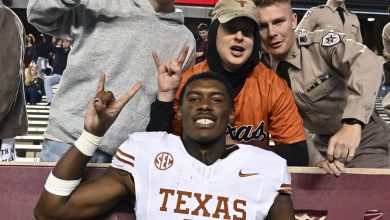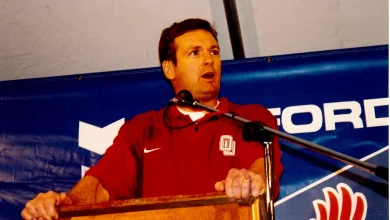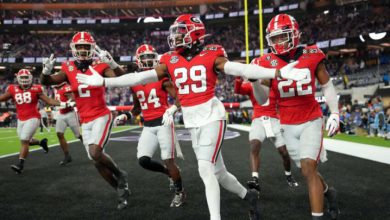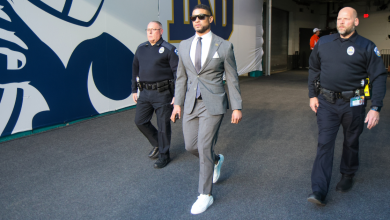Brian Schottenheimer, the new Cowboys coach, has three positive traits and two negative ones.

The Dallas Cowboys are a franchise that never lacks attention, whether from media scrutiny, fan fervor, or expectations of success. The coaching staff, in particular, plays a crucial role in the team’s success and its ability to manage the pressure that comes with wearing the star on the helmet. When Brian Schottenheimer was appointed as the new offensive coordinator for the Cowboys, it raised a range of reactions from fans and analysts alike.
Schottenheimer brings a wealth of experience to the Cowboys’ sideline, having coached in various roles across the NFL for over two decades. His previous positions with teams like the New York Jets, St. Louis Rams, and Seattle Seahawks have given him a diverse coaching background, working with a variety of quarterbacks, offensive systems, and organizational cultures. However, as with any coach, Schottenheimer’s hiring has its positives and negatives. It is important to understand both sides of the equation as the Cowboys look to improve their offensive play and compete for a championship.
This article will explore three positive traits that Brian Schottenheimer brings to the Cowboys’ coaching staff, as well as two negative aspects that might pose challenges for the team as they move forward under his guidance. By the end of this analysis, we will have a clearer picture of what the Cowboys can expect from Schottenheimer and how his impact could shape the future of their offense.
Positive Traits
1. Proven Experience with Quarterbacks
One of Schottenheimer’s greatest assets is his extensive experience coaching quarterbacks. His career has afforded him the opportunity to work with some of the best and most challenging quarterbacks in the NFL, including Russell Wilson, Mark Sanchez, and Sam Bradford. His experience in working with quarterbacks of various skill sets and personalities has prepared him for the diverse demands of leading an NFL offense.
Dak Prescott, the Cowboys’ franchise quarterback, is arguably one of the most important players on the roster. His development and performance will largely determine the success of the Cowboys’ offense. Schottenheimer’s past success working with quarterbacks gives him an opportunity to elevate Prescott’s game. Over the years, Schottenheimer has been known for his ability to help quarterbacks maximize their strengths while mitigating weaknesses. He has a reputation for being able to simplify the game for quarterbacks, helping them make faster decisions and improve accuracy.
For instance, during his tenure with the Seattle Seahawks, Schottenheimer was instrumental in developing Russell Wilson into one of the league’s top quarterbacks. Wilson’s progression in both the passing game and his ability to manage the offense efficiently was a key part of the Seahawks’ Super Bowl victory in the 2013-2014 season. Schottenheimer helped Wilson become more consistent, emphasizing decision-making, protection of the football, and maintaining a balance between improvisation and structure.
For Dak Prescott, Schottenheimer’s history could be highly beneficial. Prescott has shown flashes of brilliance throughout his career, particularly in 2016 and 2021 when he posted impressive statistics. However, his inconsistencies in big games, particularly in the playoffs, have raised questions about his development. Schottenheimer has the expertise to help Prescott take that next step in his career by refining his mechanics, improving his consistency, and focusing on his leadership in key moments. The development of Prescott is critical to the Cowboys’ chances of reaching a Super Bowl, and Schottenheimer could be the coach to get the best out of him.
2. Commitment to a Balanced Offense
Schottenheimer has long been known for his commitment to a balanced offense, which can be a key advantage for the Cowboys in their pursuit of sustained success. During his time as offensive coordinator in Seattle, he was instrumental in maintaining a strong running game that supported Russell Wilson’s passing attack. The Seahawks, despite being led by a dynamic quarterback, were consistently one of the most run-heavy teams in the NFL under Schottenheimer’s watch.
For the Cowboys, a balanced offensive attack is crucial. Ezekiel Elliott, when healthy, remains one of the league’s most dynamic running backs, and Tony Pollard has shown that he can be a playmaking threat both as a runner and as a receiving option. Schottenheimer’s ability to establish a successful running game would ease the pressure on Dak Prescott, allowing him to execute play-action passes and operate within a more controlled, less predictable offense.
In a league that increasingly leans toward high-powered passing offenses, Schottenheimer’s commitment to the running game could set the Cowboys apart from many of their competitors. By leaning on the strength of Elliott and Pollard, Schottenheimer can create a dynamic that forces defenses to respect both the run and the pass, making it more difficult for opposing teams to game plan against the Cowboys’ offense. His offensive philosophy could provide the Cowboys with a level of balance and unpredictability that they have lacked in previous seasons.
Moreover, Schottenheimer’s ability to incorporate multiple tight ends and running backs into the offense, as he did in Seattle, could help take advantage of the depth the Cowboys have in their backfield. The emphasis on a multifaceted offensive approach could keep defenses on their heels and give Dallas a competitive edge throughout the season.
3. Ability to Adapt to Personnel and Game Situations
Another positive attribute that Schottenheimer brings to the Cowboys is his ability to adapt his offense to the personnel at his disposal. One of Schottenheimer’s strengths has been his flexibility in tailoring offensive systems to maximize the talent available to him. Throughout his career, he has proven that he can adjust his offensive philosophy to fit the strengths of his roster rather than forcing players into a system that doesn’t suit their capabilities.
For example, while with the New York Jets, Schottenheimer worked with Mark Sanchez, a quarterback who was more comfortable in a run-heavy, play-action system than in a pass-first offense. Schottenheimer’s ability to adjust his schemes to fit Sanchez’s strengths helped the Jets reach the playoffs in multiple seasons. Similarly, in Seattle, Schottenheimer played to the strengths of Russell Wilson’s mobility and ability to extend plays, allowing him to thrive in an offense that was balanced between the run and pass.
For the Cowboys, this flexibility could prove essential. Dak Prescott and the Cowboys’ offensive weapons, such as CeeDee Lamb and the aforementioned running backs, have different skill sets. Schottenheimer’s ability to adapt his schemes to these talents could lead to more productive and efficient offensive play. If he can create a system that plays to Prescott’s strengths as a quarterback who excels when able to make plays both within the pocket and on the move, the Cowboys’ offense will become more dynamic and difficult to defend.
Negative Traits
1. Inconsistent Playcalling Under Pressure
While Schottenheimer has enjoyed success as a coach in many areas, one of his more notable drawbacks has been his inconsistent playcalling in high-pressure situations. Schottenheimer has occasionally struggled with being too predictable in key moments, particularly in the postseason. His game plans have sometimes been criticized for being overly conservative, lacking the creative edge that would allow his offenses to succeed in high-stakes games.
For instance, in his time with the Seattle Seahawks, Schottenheimer’s tendency to stick to a conservative, run-first game plan in key playoff games sometimes limited the offense’s ability to put points on the board. There were moments when more aggressive or innovative playcalling could have shifted the momentum in games, but Schottenheimer opted for safer, more traditional approaches.
For the Cowboys, whose playoff performances have often been marred by missed opportunities and struggles to execute in key moments, Schottenheimer’s historical issues with playcalling under pressure could raise concerns. The Cowboys are in a win-now mode, and with high expectations from ownership, fans, and players, there is little room for error in crucial playoff games. If Schottenheimer cannot elevate his playcalling when it matters most, the Cowboys could find themselves in familiar territory: a team full of talent but unable to take the next step in the postseason.
2. Lack of Creativity in the Passing Game
Another negative trait associated with Schottenheimer is his lack of creativity in the passing game, especially when compared to some of the more innovative offensive minds in the league. While Schottenheimer has developed solid offensive units in the past, his offenses have sometimes been viewed as too methodical and reliant on structure, rather than employing an unpredictable or highly dynamic passing attack.
In today’s NFL, offenses are expected to be versatile and creative in the passing game, with an emphasis on finding ways to exploit mismatches in the defense. Schottenheimer’s offenses, particularly during his tenure with the Jets and the Rams, have been criticized for relying too heavily on the ground game, with passing plays often being simple and uninspiring. For a quarterback like Dak Prescott, who excels when given opportunities to work with multiple receiving options and dynamic passing concepts, a lack of creativity in the passing game could hinder his development and the overall success of the offense.
If Schottenheimer cannot find ways to integrate more imaginative passing concepts into his offense, it could limit the Cowboys’ ability to generate big plays and consistently move the ball through the air, particularly when they face high-quality defenses in critical moments.
.









